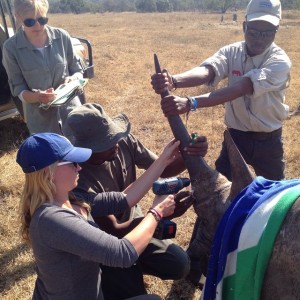Conservation is never a black & white issue

Conservation is rarely a black or white issue; not only from a racial perspective but from ethical and economic viewpoints as well. Conservation has one ultimate goal but people justify their involvement in conservation in many different ways. You get people that conserve wildlife solely for its inherent value and consider human beings to be a part of the animal kingdom that should also coexist harmoniously with the rest of nature. You also get people that are involved in conservation solely for the profit gained by trading in the wildlife they preserve and all non-humans are considered subordinate to human beings. In between these two extremes of the conservation spectrum you get a lot of grey areas where these different viewpoints are mixed together in varying degrees to justify people’s involvement in conservation.
From a purely racial perspective conservation becomes more of a red issue as opposed to it being a black or white issue with a lot of grey areas in between as with ethical and economic perspectives. All this colour talk may lead to some having grey or even blonde moments but it is actually not that confusing. Conservation has little to do with skin tones and a lot to do with the stuff under these skins whose colour people often attach different stereotypes to. Talking about race often gets people red faced and in this case red is good as it symbolises the heart. From a purely racial perspective conservation is a red issue. Simply put, being involved in conservation is a matter of the heart and how staunchly you are prepared to defend what your heart stands for regardless of your skin tone. There is a common belief that the lighter skinned population can afford to care about wildlife while the darker skinned people are too poor to devote any of their money to conservation. Before even thinking about money people have to defend what their hearts stand for, regardless of their skin colour.
Following your heart starts at an early age and again this is regardless of the amount melanin in your skin. If one is brought up in a society that encourages following norms then they are unlikely to be trendsetters. If one is raised by parents that nurture individuality as opposed to moulding a child to conform to society’s preconceived notions of the ‘perfect child’ then they are likely to be radical thinkers. Conservation is generally considered a strange field of study or work and those involved in this field are christened with names nicknames such as ‘bunny huggers’, ‘greenie beanies’ or even ‘hippies’. If you are one of those people that strive to conform to society’s norms regardless of what your heart desires then you are bound shun fields that the majority consider to be ‘not normal’. If you are a stern follower of what your heart believes in then you will wear the tags society has given to you with pride and continue hugging trees.
Being a South African exposes me to many racial stereotypes, tensions and views since the country is one of the most racially diverse countries in the world. Personally I have found my involvement in conservation and that of other darker skinned people like myself often surprises people for non-racial reasons. Many South Africans I have interacted with, regardless of their race, are not as surprised by a dark skinned ‘bunny hugger’ as they are surprised by how staunchly I follow my heart. This again brings it back to the red and not the black or white. The red equals the heart regardless of the black or white or whatever race you are classified into. The heart equals the start of everything that makes a person who and what they are. Individuality also starts with the heart and how much you are willing to follow it. Most of my fellow South Africans, regardless of their race, do not follow their hearts. This is evidenced by how the country’s many cultures are fading away as most people choose to sheepishly follow western norms.
Based on my experiences so far, involvement in conservation has little to do with race. It all starts with whether one is brought up in an environment that nurtures individuality or an environment that breeds followers of norms. How stubbornly one is prepared to follow their hearts into conservation fields despite society’s negativity determines whether or not they are worthy of the ‘bunny hugger’ tag. The black or white skin tones are just decorations for the tag, not a determining factor.
– Fortunate M. Phaka